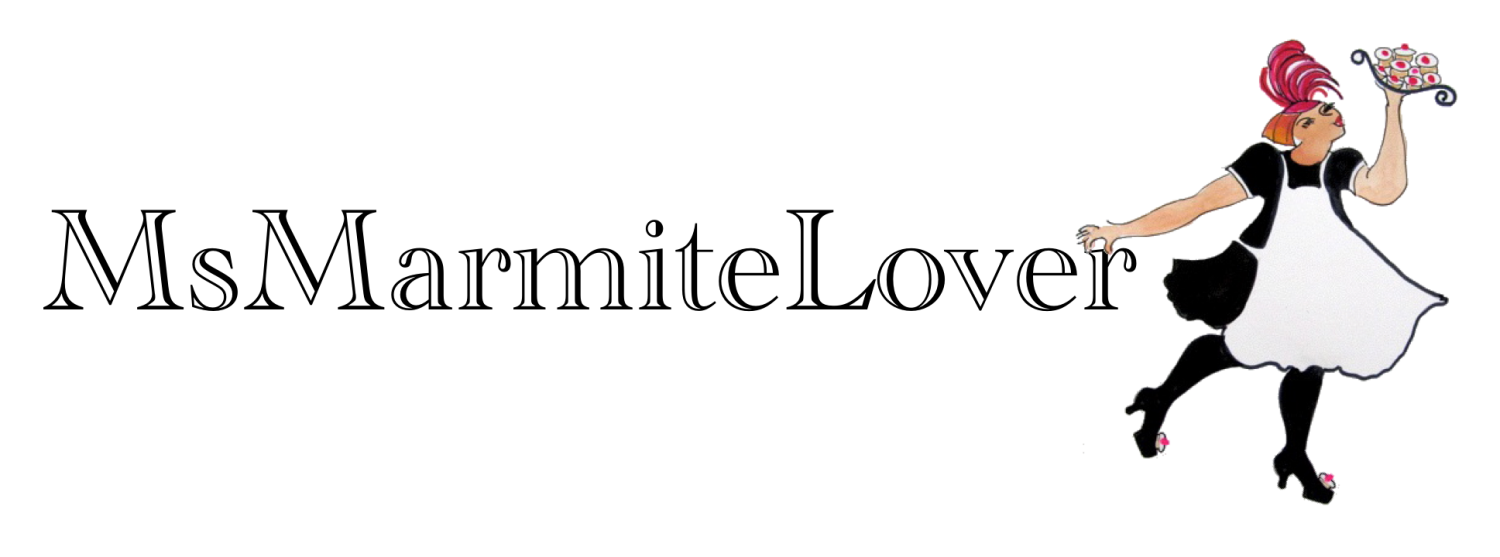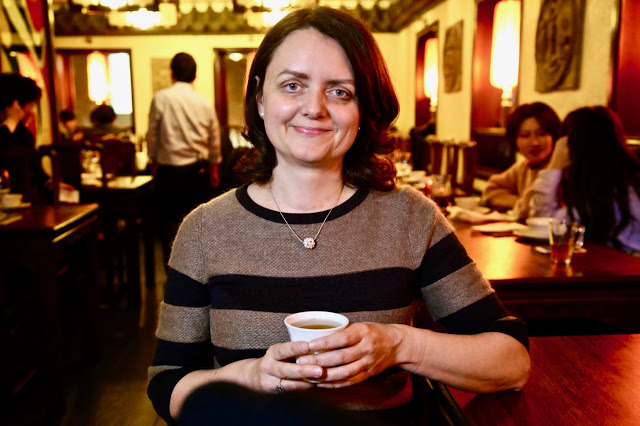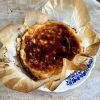I met Fuchsia Dunlop, the British expert on Chinese food, on a rainy January evening at the friendly Bar Shu, a Sichuan restaurant in London’s Chinatown. Her latest book Land of Fish and Rice, Recipes from the Culinary Heart of China has been shortlisted for the Andre Simon Food and Drink Book Awards for 2016.
Thanks for meeting me today. Your name is unusual. The only other Fuchsia I’ve ever heard of was a character in the Ghormenghast trilogy.
(Smiles) My parents were reading that when they had me.
You helped develop the menu here at Bar Shu?
Yes, menu development, and I’m representing them.
The kind of work you do for them… do you advise on what would work for the Western public, or whether this will translate or not?
Yes, I give them a Western point of view because they already know the Chinese market very well. When they first opened, they weren’t very interested in having the traditional dishes, which were old hat in China. But some of them, like Gong Bao Chicken or dry fried green beans, have gone on to be best sellers.
Do you ever cook fusion type stuff?
I just cook what I feel like cooking. When I write books, I try to be very accurate – that’s the whole point.
You are about to go to Sri Lanka to be a guest chef. Are you going to be talking about and cooking from your latest book?
I’m doing one dinner from Sichuan and one from Jiangnan region, which is from the Land of Fish and Rice book, and a cooking class from both.
How long did you live in China for?
The longest period without leaving the country was a year and a half. But I’ve just been going backwards and forwards.
You lived there in ’94. That’s pre this whole foodie craze. When I grew up, food wasn’t part of the culture as it is now. Now everybody wants to be a cook or food writer.
My mother has always been a very adventurous cook and a very good cook. I grew up cooking from childhood with lots of very international flavours because my mother taught English as a foreign language. We grew up with my mother’s students and they would cook dinners. Many of them became family friends, coming to stay from all over the world – Iranians, Lebanese, Sudanese, Turkish.
From quite a young age, I actually wanted to be a chef. But I grew up in Oxford and all my friends were going to university. I did English at university while cooking quite seriously.
You were a journalist for the BBC? Or an editor?
I owed my parents lots of money but I wanted to go travelling. So I got this job sub-editing for the BBC, reading and correcting the English for the Asian Pacific region. I got interested in China.
I went on holiday to China, loved it, and started learning Mandarin. I got a scholarship. I was supposed to be doing something more academic but when I got to China, my Chinese wasn’t good enough really, so I concentrated on learning the language.
I just started cooking. I literally asked restaurants in the neighbourhood that I liked whether I could study in the kitchen. It began out of curiosity.
Since I was a teenager, I’ve always had notebooks with menus in them. I can’t remember when I started thinking in terms of books.
You specialise in the Chengdu and Sichuan region, is this the first book you’ve done about another region?
No, I did one on Hunan, The Revolutionary Chinese Cookbook.
Which is your favourite region in China?
Sichuan and Jiangnan. If you’re talking about great cuisines that are very complex and many layered, Sichuan and Jiangnan cuisines are more sophisticated and complex. In Hunan, the food was delicious but it was very difficult living there. It was during the Sars epidemic, which is atypical pneumonia. All the foreigners left and travelling became difficult.
There are so many magical experiences. Each region has different aspects – Sichuan was thrilling, racy, exciting; Jiangnan is harmonious, lyrical, beautiful. It’s very nice food to live on and to calm down and eat healthy.
It’s almost more clean eating.
Yes. In Land of Fish and Rice, I wrote that many of the things that people are concerned about now in the West; eating simpler cleaner food, eating more vegetables, less meat, eating in a balanced way, also the obsession with provenance, sourcing good ingredients, is very strong in this region. There are so many things that we consider modern or Californian or Nordic or whatever but actually have deep equivalents in China and can be found in this region.
I don’t eat meat and one of the problems for me in Chinese restaurants is the prevalence of it. I remember reading in Alex Renton’s book Planet Carnivore that Chinese stir-fry is about making protein go further. My best friend who has left the country now was a blogger called Bellaphon, who is Chinese Malaysian. He would never take me to Chinese restaurants because he told me they’d all lie about the stock.
Oh, yeah. It’s not so much lying. It’s just that in China people tend to eat everything in general. The only people who are strict vegetarians are Buddhist monks. Even Buddhist believers tend to be part-time vegetarians. They might eat vegetarian when they go to the temple or on certain days of the Buddhist calendar. Even strict vegetarians, if they were feeling a bit worn out or ill, they’d eat a meat soup.
I think there is confusion. If you went to a Chinese restaurant they’d understand that a vegetarian like you — that you eat mainly vegetables but if you want a bit of meat, it doesn’t count.
There are arty intellectual types, say in Shanghai, where vegetarianism is becoming more fashionable as a reaction against pollution and materialism. So you don’t get people who are inclining towards vegetarianism in your sense. But they have the same problems as you. They probably think it’s ok to have a meat stock. You have to tell them: ‘I don’t want stock, I don’t want lard.’
So it’s difficult to explain it to them. The other thing about Chinese food: they love texture. Often they like rubbery or slimy texture.
Westerners haven’t developed an appreciation or pleasure in variety of texture. Westerners find texture disgusting: slithery, gristly, rubbery – even the words sound disgusting. In China they are lovely, different, interesting experiences.
Have you become Chinese?
No, but when it comes to food I’ve been totally influenced by China. A recent example, I had dinner with this friend, a restaurateur. We had a fish tail, with very little meat, a spine, with lots of sauce. It was tremendously messy, with very little meat; you pick apart the spine, lovely gooey stuff in between. We ended up with this sauce all over our hands, all over our face.
So we finished eating this. Then he looked at me and said, ‘of course we wouldn’t give this to a normal foreigner’. So I definitely eat like a Chinese now.
Do you eat Chinese at home?
Oh, yes.
Is that your go-to? You’ll do something Chinese?
Yeah, not exclusively, but at the moment almost all Chinese. You don’t have to know a tremendous amount about how it works. When I’m working at home, it’s noodles… various kinds of noodles.
… not pot noodles?
No! Not necessary. Noodles are very easy to make. It’s a really nice way to eat. It can be very quick. Very healthy, lovely vegetables. Fresh and fast.
Which is one of the reason people are eating cook-chill meals: mums are working, they get home, they haven’t got time. But actually Chinese is something they could cook quickly.
Also you can do things like, for example, make a slow cooked pork stew and freeze the leftovers. I often do that. Then have some fresh stir-fried thing. Have a jar of fermented tofu in the fridge, which is lovely with rice.
You speak fluent mandarin. Do you write it as well? Can you do all the characters?
Not all of them. The thing is if you specialising in anything, you have to learn the characters. There is a whole vocabulary of cooking methods that have no equivalent in English. Or if I’m trying to record a recipe, I might not always know the ingredients, I might have to look up them afterwards. It’s also much quicker to use characters.
Is there a dictionary with all the Chinese cooking characters?
Sometimes it’s quite complicated, you have to work out different names for different regions, different dialects. That can be confusing. Sometimes I’ll have to search in a number of things.
The brilliant thing that’s really changed my life is the software on my iPhone. I used to carry a small dictionary with me and it wouldn’t be a small dictionary. With Chinese you have to look up three times. You have to first look up the radical, then find the character. (The radical is one bit of the character.) You look at the list of radicals and you find your character underneath. Then you look it up in the dictionary. It’s very tedious. Now I can write it in my phone or write it phonetically, it’s totally transformational – so much easier.
Have you ever eaten anything that was too disgusting that you just wouldn’t eat?
I’ve eaten things that I also found disgusting, sure. But I taste everything. I think by now I’m just interested.
The two things I didn’t much like eating, but did eat, were pigs intestines and stomach. But I’ve had some very good ones in recent years. I’ve got over that and I like them.
Is it a textural thing?
No. If they aren’t prepared very well, they can have a slight offally taste. But I’ve grown to love even them. Of course, when I first lived in China, I was constantly faced with things I’d never had before. But there was a moment of daring: ‘can I do this?’ But I’ve grown used to it. Crossing that threshold doesn’t mean anything anymore. I know I’m going to try it; I know I’m going to like it. I also just have utmost respect for China as a gastronomic culture. The Chinese really know what’s good in food.
You talked about the effect of the cultural revolution on their cuisine. Haute cuisine was denigrated, even street stalls were regarded as capitalist. I was thinking about comparing that with British food: how it went through the doldrums, how the war affected it, how we went through rationing. Our cuisine really suffered and was quite bland for many years but actually most countries have gone through some kind of war and yet their food hasn’t suffered in the same way.
Cuisine is a living form of culture, which is being recreated on a daily basis. It’s totally responsive to what’s going on. Look at Syria now, there has been quite a bit written about the terrible disintegration – on networks, on restaurants and the craft and so on. People are trying to carry on in exile.
China is very unusual. The cultural revolution was a political assault on fancy food.
Was tasty food regarded as some kind of bourgeois affectation?
Not so much tasty food, but fancy food and fancy restaurants were seen as being elitist. There was a phrase, ‘cheap and filling food for the masses’ – not having exotica and banqueting and that sort of thing. Some restaurants were forced to be renamed with revolutionary names, like ‘The East is Red’. Chefs were persecuted. In the cultural revolution in the 1950s, all the restaurants were nationalised, which completely changed the culture. There was a time it wasn’t ok to be a small time trader. There was a period when tea houses closed.
It’s interesting the influence of politics on food. I wonder if when politics is more left wing, food becomes plainer, more peasant-y?
Yes, undoubtedly. There is quite a good book by Jack Goody, an anthropologist who looks at food and class. You get the most elaborate cuisines in countries with very stratified and complex social systems, lots of different layers of class. The French, the Chinese…
Hierarchical food…
That’s when you get great cuisines. It’s all very elaborate and interconnected, plus great street food, rustic food, and at the top a very elaborate food culture. You tend to get simpler cuisines, for instance, in some African societies where everyone’s equal and they only have one chief.
I don’t know a lot about African food. I don’t think anyone knows much about it yet in the West.
Did you know I’m actually a bit of a cult in China?
No. Why?
I’m part of the Dark Twisted Cookery movement. I noticed I was getting hundreds and thousands of hits from China. I then realised that a food blogger (in fact a tweeter, or the Chinese equivalent, a food micro blogger from Weibo) discovered my blog. The great thing about China is that there are so many people so even if .009 percent of the people look at your blog, that’s a lot of people. But basically they were taking the piss out of my food. It went viral. It was in the China Daily.
Really? I’d be really interested to see.
I was always using Google Translate to try and work out what they were saying.
I wrote a piece about taking three chefs to The French laundry. Chinese people in general think Western food is very simple, really monotonous. They can’t believe you might have a meal with just a big chunk of meat and some vegetables, just have three dishes. This is so boring and one-sided for them.
My food – I don’t cook very British food. Partly because I don’t cook meat.
The Chinese people do have excellent food and they are very attached to it. Everyone does that. People like us are the exception, people who are curious about food. It’s quite normal to define your cultural boundaries by saying what other people eat is disgusting.
One of the things they laughed at was my stargazy pie. I thought, ‘hello, the Chinese love fish heads, what’s so gross about that?’ They found my aubergines in chocolate very funny, which I understand. It didn’t seem entirely respectful.
You are just getting a taste of what it’s like the other way round. Freaky food in China. There was a period when every TV crew went to this penis restaurant in Beijing. Yes, it’s very funny, but it’s not typical.
What was it penises of?
Not sure. There are penises from different animals.
Have you ever been there?
No. (Laughs.)
When a very good friend came to London, I took her to a French restaurant, a nice place. She had a pigeon breast salad and the pigeon breast was rare… the Chinese don’t eat raw food. When I saw she was anxious, I explained to her in Chinese terms that the chefs would think it would be 過熟, it would be leathery if it were fully cooked. Then she ate it up.
Did she like it?
Yes. I do know Chinese chefs living in London that like Western food who are open minded. Most people if they’ve had Western food, it’s KFC or Pizza Hut. Young people tend to like Western food. Older people won’t. You can’t really expect them to like it. People see it as food for children. Some of my friends would take their children to KFC.
It’s gimmicky, slightly jokey food.
Children like it. It’s easier ordering. If you’ve got a bunch of children who are very noisy, it’s convenient.
In China they are still eating basically Chinese food.
In places like Shanghai, which are very sophisticated and cosmopolitan where there are more Chinese people who have lived in the West, there are very good Western restaurants. There are people who will dip in and out, like in London, but that’s not really the norm.
Are they getting fatter and taller?
China has terrible rocketing rates of obesity and type 2 diabetes, as they start to adopt a more sedentary lifestyle.
Are they eating more dairy?
Yes, children eat more dairy, more sweets. They are making the same mistakes we are.
I thought it was quite funny in your memoir, Shark’s Fin and Sichuan Pepper, that if you brought apple pie to a dinner, your Chinese friends piled it on their plates with all the savoury dishes. I also thought about our history of food before the Russian service in which we had courses, that’s how we used to eat, wasn’t it?
Yes, and then you think of cold meats and chutneys, sweet and savoury. In some regions, there might be more formal wedding banquets with sweet soup at the end.
It’s not for digestive reasons that we have sweet things at the end.
I went to a restaurant with a Chinese friend and we had a really fabulous meal, a tasting menu scenario with exquisite food. Like any Western tasting menu, it ended up with several sweet dishes – very rich, very heavy. My friend said, ‘It’s very heavy, a bit much.’
Even at a Chinese banquet where you eat lots of food, it would take you to a place of comfort at the end. You might have a refreshing soup to finish the meal. In China, food is about feeling comfortable. Much more thought goes into balance, the comfort of the body, not just taste.
Like Chinese medicine or ayurvedic Indian food or the humours.
It’s very similar, it’s all about balance. There are no divisions in food.
It’s almost like food is grammar, a dinner is a sentence. For some reason, our sentences always end on a sweet note and for some reason theirs don’t.
There are some areas where people eat a lot of sweet things. But in much of the country they don’t eat nearly as much sweet food as people typically do in the West.
Do they eat sweeter food in colder regions?
No, in fact it’s rather the opposite. In Suzhou, which is a region I’ve written about, they have lots of sweet dishes. It’s in the middle of China. It’s hot. Availability of sugar cane has something to do with it.
The only place I’ve been to in China is Tibet. I spent three months there in 1987.
Amazing. Tibet is not a place a place for gastronomy. The traditional food is very simple and limited. Now in the cities they also have Chinese restaurants. It’s culturally very distinctive and different. Most of the restaurants were Muslim restaurants; a lot of the restaurants are run by Chinese Muslims.
Are your books translated into Chinese? Are there many Chinese cookbooks?
Sharks Fin and Sichuan Pepper is translated for Taiwan and Hong Kong.
There is a huge Chinese cookbook market. There are a lot of cookbooks that are just recipe books. Now there are travelogues about food, and essays about food. There aren’t many with cookery techniques blended with the ethnographic.
Friends say my books should be translated because people like the outsider’s eye. All the things that I remark on, they don’t notice, as they see them every day.
Sharks Fin and Sichuan Pepper is very funny. For this latest book, you’ve been nominated for a prize. How do you feel about being shortlisted for the Andre Simon awards?
Very honoured. There are some very good books in the line-up.
It was really nice to actually meet, I’ve been an admirer for a long time.
Buy Land of Fish and Rice here.
fuchsiadunlop.com
Twitter: @fuchsiadunlop
Instagram: @fuchsiadunlop
The Andre Simon awards winner will be announced on January 24th.






[…] on Sichuan cooking, now with a cloth-bound cover in lucky red, is humbling. The chef and author Fuchsia Dunlop speaks and writes fluent Mandarin, is the first westerner to train at the Sichuan Institute of […]